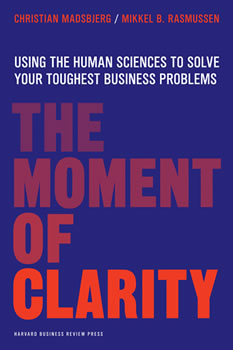 Decisions based on data models are woefully incomplete – no matter how carefully we collect and analyze the data. What’s missing from the decision is our customers’ experiences. And the authors of this book (Christian Madsbjerg / Mikkel Rasmussen) claim that human sciences has the answer through the study of phenomena.
Decisions based on data models are woefully incomplete – no matter how carefully we collect and analyze the data. What’s missing from the decision is our customers’ experiences. And the authors of this book (Christian Madsbjerg / Mikkel Rasmussen) claim that human sciences has the answer through the study of phenomena.
Data models excel at solving problems that we’ve seen before and have a tested system to address them. But what about those problems that we’ve not seen before and don’t really have a clue how to tackle? The wrong decision can bankrupt your business because of these blind assumptions:
- People are rational and fully informed.
- Tomorrow will look like today.
- Hypotheses are objective and unbiased.
- Numbers are the only truth.
- Language needs to be dehumanizing.
In 2000, LEGO was the 5th largest toymaker in the world. By 2004, it was losing $1,000,000/day! It achieved clarity on its tough problems, using sensemaking:
- Frame the problem as a phenomenon (instead of “what toys do kids want”, LEGO asked “what is the role of play?”)
- Collect the data (instead of analyzing sales, LEGO watched the family experience)
- Look for patterns (instead of depending upon assumptions, LEGO pored over the data to identify common childhood patterns)
- Create the key insights (LEGO built on the patterns to create appropriate new products)
- Build the business impact (LEGO rejects products that aren’t a match for company’s aesthetics and ethics)
In your business strategy, make sure you balance the quantitative with the qualitative. Numbers without appropriate context won’t serve you long-term, especially in disruptive times.